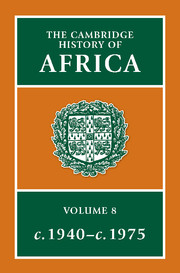Book contents
- Frontmatter
- Introduction
- 1 The Second World War: prelude to decolonisation in Africa
- 2 Decolonisation and the problems of independence
- 3 Pan-Africanism Since 1940
- 4 Social and cultural change
- 5 The economic evolution of developing Africa
- 6 Southern Africa
- 7 English-speaking West Africa
- 8 East and Central Africa
- 9 The Horn of Africa
- 10 Egypt, Libya and the Sudan
- 11 The Maghrib
- 12 French-speaking tropical Africa
- 13 Madagascar
- 14 Zaire, Rwanda and Burundi
- 15 Portuguese-speaking Africa
- Bibliographical essays
- Bibliography
- Index
- References
1 - The Second World War: prelude to decolonisation in Africa
Published online by Cambridge University Press: 28 March 2008
- Frontmatter
- Introduction
- 1 The Second World War: prelude to decolonisation in Africa
- 2 Decolonisation and the problems of independence
- 3 Pan-Africanism Since 1940
- 4 Social and cultural change
- 5 The economic evolution of developing Africa
- 6 Southern Africa
- 7 English-speaking West Africa
- 8 East and Central Africa
- 9 The Horn of Africa
- 10 Egypt, Libya and the Sudan
- 11 The Maghrib
- 12 French-speaking tropical Africa
- 13 Madagascar
- 14 Zaire, Rwanda and Burundi
- 15 Portuguese-speaking Africa
- Bibliographical essays
- Bibliography
- Index
- References
Summary
By 1939 the European colonial powers were as firmly in control of their African territories as they ever would be. During the preceding ten years there had been few major challenges to their authority. Africans had come to accept the new political order and to obey the rules laid down by the colonial administration. The lesson had been learned that, although the colonial administration was thin on the ground, in the last resort it had overwhelming resources of power. Attempts to take advantage of the weakness of some colonial administrations during the First World War and to return to an independence based on pre-colonial political structures, though temporarily successful, had failed. Such challenges to the colonial authorities as did take place during the 1930s were made within the framework of the colonial state and were by and large limited to protest against obnoxious features of the administration; such protest took the form of riots against taxation or strikes to obtain higher wages or better conditions of service in the small colonial industrial sector. With the notable exception of French North Africa, there were few violent demonstrations of a modern political character, that is, aimed at securing greater participation by Africans, and more specifically the small educated élite, in the governmental processes of the colonial state. Nevertheless it was clear that if the educated élite accepted the status quo it was a passive not an active acceptance: they hankered after an independence, but, like the British, they saw it as a goal whose realisation was distant.
- Type
- Chapter
- Information
- The Cambridge History of Africa , pp. 8 - 51Publisher: Cambridge University PressPrint publication year: 1984
References
- 8
- Cited by

